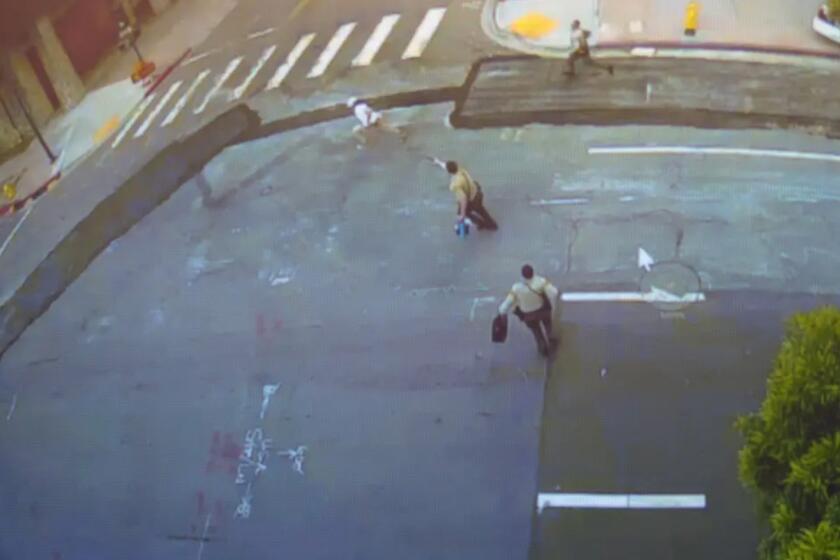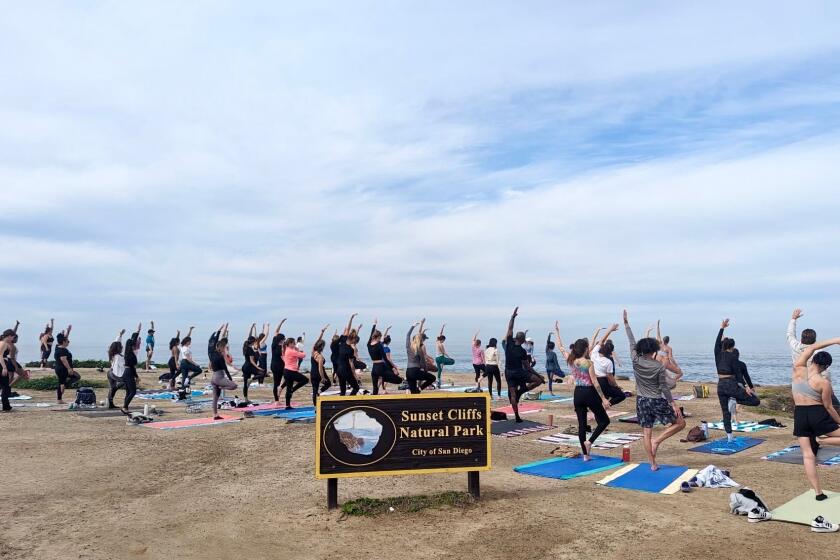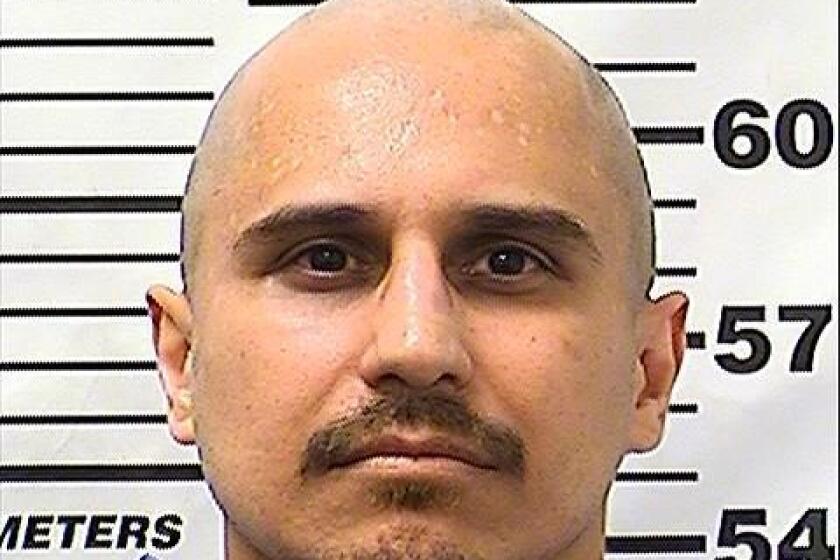$30-MILLION LIBEL SUIT FILED IN WAKE OF ARREST
At about 8 p.m. local time on the night of Dec. 2, Terry G. Rouse, 28, was painting the baseboard of a friend’s apartment in a working-class suburb near here when her life took a sudden and startling twist.
With guns drawn, a small army of deputies, led by the elected sheriff of Harris County, this state’s most populous county, burst through the apartment’s unlocked front door. Sheriff Johnny Klevenhagen shoved her against a wall, handcuffed her and, according to Rouse, informed her that she was under arrest for “violation of narcotics.”
Then things really turned strange.
According to Rouse, she was read her Miranda rights (the right to an attorney, the right to remain silent, etc.) and then placed by herself on a sofa in the living room of the apartment as the sheriff and the deputies crowded into the tiny kitchen to watch TV.
She says she heard one of the officers say, “ ‘Miami Vice,’ look out!” It was then that Rouse figured out that her arrest, which was later declared invalid by a state district judge, had been broadcast live across the country. Later still, she learned that TV newscaster Geraldo Rivera had told a vast audience of 15 million homes that she was an alleged prostitute selling speed to truckers.
And even later, Rouse learned that she had reason to claim she had been libeled by Rivera, Klevenhagen and others. She and her own army of four lawyers filed her suit here Monday. They want $30 million, $2 for every television home that was tuned in that night.
The case stems from the controversial “American Vice: The Doping of a Nation” broadcast that included live coverage of police drug raids in Miami and San Jose as well as Houston. Of the nine persons arrested (not all the arrests were shown on the air), five have been released for lack of evidence. Only Rouse, so far, has taken the case to civil court.
Named in the suit are Rivera, Tribune Entertainment Co., Rivera’s production company (Maravilla Productions Co.), Klevenhagen and other local officials. Rouse’s lawyers said they may add other defendants.
“I’m scared. I really am,” Rouse said in an interview. “I’m still shocked about this. I hope that what comes out of this is that it won’t happen anymore to innocent people.”
Rivera’s New York office said he was out of town until after the New Year’s holiday. The office referred calls to Tribune Entertainment in Chicago.
Charles Sennet, an attorney for Tribune Entertainment, said the company had not received a copy of the suit and would not comment. “We’ll respond to it in court,” he said.
In addition to the libel issue, the “American Vice” case raises a number of unusual legal and journalistic questions:
--Of the estimated 2,000 drug arrests conducted in the country daily (a statistic repeated often during the Dec. 2 program), how many involve innocent persons? The show made no effort to examine the disposition of the cases of persons arrested and only cursorily looked at the civil-liberty issues raised by the police actions.
--Was the show a bona fide news program or an entertainment special? Does it matter? “American Vice” was not produced by an established news organization, and its distributor was the entertain-ment division of a national media conglomerate, which owns newspapers and television stations nationwide, including the Chicago Tribune and KTLA Channel 5 in Los Angeles.
--What obligation or responsibility does a one-time program, as opposed to a daily or weekly broadcast, have to correct the record or issue retractions? Tribune Entertainment has said it plans no follow-up broadcast, and the occasional nature of Rivera’s shows does not lend itself to a timely discussion of previous programs.
--What should the relationship be between law-enforcement agencies fighting the nation’s drug and crime problems and the independent and often adversarial press covering police actions and misconduct? The San Jose police have banned TV crews from future drug raids. At its heart, the “American Vice” case points to the apparent coziness between the Harris County, Tex., sheriff’s office and Rivera for the arrest of an innocent person.
--And, finally, since most of the 163 stations that aired the program were contractually obligated to rebroadcast the show, did they compound the alleged libel by broadcasting it after Rouse was released? The local Houston station, for example, re-aired the show but deleted the Rouse episode.
Rouse claims in her suit that Rivera and Klevenhagen maliciously used her in a “conspiracy to arrest, imprison, prosecute and defame anyone they found” in order to boost the ratings for the program. The show was entertainment, not news, she and her lawyers say.
And Rouse is not, she says in the suit, a “drug-pushing whore.” The attorneys have not determined how Rivera reached that conclusion, for the warrant authorizing the Dec. 2 raid mentions neither speed nor prostitution. Nor, for that matter, does the warrant include among the 11 law officers empowered to enter the Channelview, Tex., apartment a camera operator for the “American Vice: The Doping of a Nation” program.
The warrant doesn’t mention Rouse, or anyone matching her description, either.
Rouse, a house painter, beautician and sheet metal worker, said that she’s “angry and embarrassed” by the Dec. 2 episode and the cascade of national and local publicity that has followed.
She claims that since her arrest, strangers have come up to her and offered money for sex or drugs, and that her unsought notoriety has made it difficult to find work.
Rouse, who continues to live in the small town of Channelview, says friends are providing her money to live on.
Her lawyers estimate that the suit could eventually cost as much as $500,000. They have taken the case on a contingency basis, but refuse to disclose their share of the award or eventual settlement, should there be one.
“We’re tugging on Superman’s cape here,” said attorney Shannon T. Nash. “We expect to be jerked around the country” taking depositions, gathering evidence and interviewing prospective witnesses.
He said the case resulted from the “unholy marriage of entertainment and a police organization.”
Nash said Rouse’s attorneys had repeatedly sought on-air apologies from Tribune Entertainment prior to their filing the suit. Losing the libel suit, he said, would mean that the “Geraldo Riveras of the world could do this with any police organization.”
The lead attorney in the case is Houston litigator Mary Heafner, brought in by Nash and his partners because they lacked trial experience in a case of this sort.
“A lot of people--believe it or not--think Terry Rouse is a prostitute and a drug pusher because Geraldo Rivera said she was,” Heafner said. The $30 million in damages, she said, is necessary “not so much to enrich” Rouse as to “punish” and provide a “hand slap” to Rivera and others.
She was especially critical of the public comments of Rivera since the broadcast. Most notably, Heafner was angry about a comment Rivera made Dec. 17 on the “Entertainment Tonight” program. Rivera said the press has portrayed Rouse as the “St. Joan of house painters” and characterized lawyers who have taken cases against him over the years as “legal hyenas.”
“I’m the lead hyena at this time,” Heafner said.
More to Read
Start your day right
Sign up for Essential California for news, features and recommendations from the L.A. Times and beyond in your inbox six days a week.
You may occasionally receive promotional content from the Los Angeles Times.






